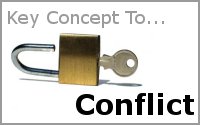I have seen “problem” defined as “a situation that you want to change.”
Under this definition, if I don't want to change the situation, I don't have a problem.
If, I want to change the situation, then I have a problem.
Every situation that I want to change has something wrong with it. In general, I don't want to change things that are running smoothly.
If something is wrong with the situation, then something either has happened or will happen to make the situation undesirable. To solve the problem, I have to consider that my thoughts, ideas, and feelings about the circumstances surrounding the situation just might be wrong.
There might be a different way to describe the situation that allows me to see a better solution than the first one that popped into my head.
Staying open to alternative solutions was one of the most powerful lessons I learned as a process design and development engineer. Since then, I have read numerous books, articles, and essays on how to keep my mind open to different problem solving approaches. I have watched videos and listened to audio programs on creativity.
I keep striving to quiet the voice in my head that says, “the first solution I found is the one and only right way to solve this problem.”
In working with people, I have learned that resolving conflict is just like solving a problem.
An interpersonal conflict is generally a situation that I want to change. So, it fits in the definition of a “problem.”
So, when I attempt to resolve workplace or family conflicts, I need to consider that I just might be wrong.
I really dislike this idea. It forces me to get outside my own perspective in the moments when I really do not want to make the effort.
Sadly, the same little voice I mentioned above often tells me that the source of the problem I face in resolving a conflict is the other person.
This morning, I read a great post titled Kill Your Little Darlings over at Women on Business. M.J. Ryan, the author of this post, starts this way:
William Faulkner once said that writers needed to “kill their little darlings.” It’s a message about how, in order for inspiration to enter, we need to let go of the ideas we’re so in love with to make room for something better. It’s a willingness that everyone in business needs these days.
What a great concept! This idea applies to writers, to business owners, and to people attempting to resolve workplace conflicts.
In order to resolve a conflict, I have to be willing to consider ideas, thoughts, and feelings other than my own.
I have to set aside my perspectives, if only momentarily, to step into the world of the other person. To do that, I need to “kill my little darlings” and consider the thought that I just might be wrong.

 Three Ways to Deal with an Angry Person
Three Ways to Deal with an Angry Person What a Diverted United Airlines Flight Can Teach You about Conflict Resolution
What a Diverted United Airlines Flight Can Teach You about Conflict Resolution You Have to Have a Goal to Achieve a Goal
You Have to Have a Goal to Achieve a Goal A Collection of Conflict Resolution Quotes
A Collection of Conflict Resolution Quotes